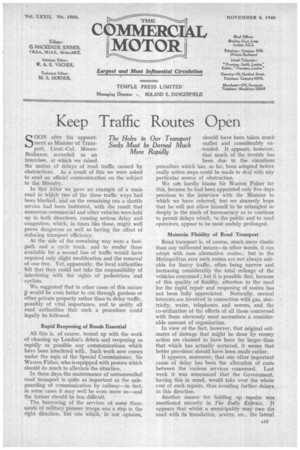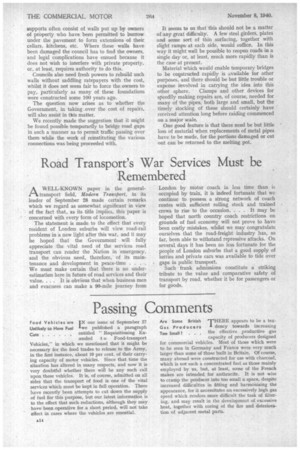Keep Traffic Routes Open
Page 15

Page 16

If you've noticed an error in this article please click here to report it so we can fix it.
SOON after his -appointment as Minister of Transport, Lieut.-Col, MooreBrabazon accorded us an interview, at which we raised the matter of delays of road traffic caused by obstructions. As a result of this we were asked to send an official communication on the subject to the Ministry.
In this letter we gave an example of a main road in which two of the three traffic ways had been blocked, and on the remaining one a shuttle service had been instituted, with the result that numerous commercial and other vehicles were held up in both directions, causing serious delay and congestion, which, in times like these, might well prove dangerous as well as having the effect of reducing transport efficiency.
At the side of the remaining way were a footpath and a cycle track, and to render these available for a second line of traffic would have required only slight modification and the removal of one tree. Yet, apparently, the local authorities felt that they could not take the responsibility of interfering with the rights of pedestrians and cyclists.
We suggested that in other cases of this nature it would be even better to cut through gardens or other private property rather than to delay traffic, possibly of vital importance, and to notify all road authorities that such a procedure could legally be followed.
Rapid Reopening of Roads Essential All this is, of course, bound up with the work of cleaning up London's debris and reopening as rapidly as possible any communications which have been interfered with. Such work now comes under the xgis of the Special Commissioner, Sir Warren Fisher, who is equipped with powers which should do much to alleviate the situation.
In these days the maintenance of untrammelled road transport is quite as important as the safeguarding of communication by railway—in fact, in some cases it may well be even more so—and the former should be less difficult.
The borrowing of the services of some thousands of military pioneer troops was a step in the right direction, but one which, in our , opinion, should have been taken much earlier and considerably extended. It appears, however, that much of the trouble has been due to the circuitous procedure which has, so far, been adopted before really active steps could be made to deal with any particular source of obstruction. We can hardly blame Sir Warren Fisher for this, because he had been appointed only five days previous to the interview with the Minister to which we have referred, but we sincerely hope that he will not allow himself to be entangled so deeply in the mesh of bureaucracy as to continue to permit delays which, to the public and to road operators, appear to be most unduly prolonged.
Maintain Fluidity of Road Transport ' Road transport is, of course, much more elastic than any railbound means—in other words, it can adopt with ease alternative routes ; but in the Metropolitan area such routes are not always suitable for heavy traffic, often being narrow and increasing considerably the total mileage of the vehicles concerned ; but it is possible that, because of this quality of fluidity, attention to the need for the rapid repair and reopening of routes has not been fully appreciated. Naturally, several interests are involved in connection with gas, electricity, water, telephones and sewers, and the co-ordination of the efforts of all those concerned with them obviously must necessitate a considerable amount of organization.
In view of the fact, however, that original estimates of damage that might be done by enemy action are claimed to have been far larger. than that which has actually occurred, it seems that better provision should have been made earlier.
It appears, moreover, that one other important cause of delay has been the allocation of costs between the various services concerned. Last week it was announced that the Government, having this in mind, would take over the whole cost of such repairs, thus avoiding further delays in this direction.
Another reason for holding up repairs was mentioned recently in The Daily Express. It appears that whilst a municipality may own the road with its foundation, sewers, etc., the lateral supports often consist of walls put up by owners of property who have been permitted to burrow under the pavement to form extensions of their cellars, kitchens, etc. Where these walls have been damaged the council has to find the owners, and legal complications have ensued because it does not wish to interfere with private property, or, at least, requires authority to do this.
Councils also need fresh powers to rebuild such walls without saddling ratepayers with the cost, whilst it does not seem fair to force the owners to pay, particularly as many of these foundations were constructed some 100 years ago.
The question now arises as to whether the Government, in taking over the cost of repairs, will also assist in this matter.
We recently made the suggestion that it might be found possible temporarily to bridge road gaps in such a manner as to permit traffic passing over them while the work of reinstituting the various connections was being proceeded with. It seems to us that this should not be a matter of any great difficulty. A few steel girders, plates and some sort of thin surfacing, together with slight ramps at each side, would suffice. In this way it might well be possible to reopen roads in a single day or, at least, much more rapidly than is the case at present.
Material which would enable temporary bridges to be copcstructed rapidly is available for other purposes, and there should be but little trouble or expense involved in carrying the idea into this other sphere. Clamps and other devices for speedily making repairs are, of course, needed for many of the pipes, both large and small, but the timely stocking of these should certainly have received attention long before raiding commenced on a major scale.
One good feature is that there need be but little loss of material when replacements of metal pipes have to be made, for the portions damaged or cut out can be returned to the melting pot.




















































